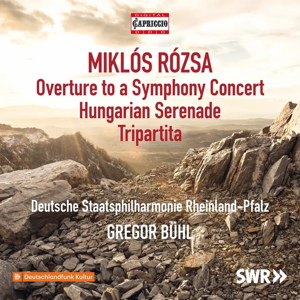
Miklós Rózsa (1907-1995)
Overture to a Symphony Concert Op.26a (1957/1963)
Hungarian Serenade Op.25 (1956/1963)
Tripartita Op.33 (1972)
Deutsche Staatsphilharmonie Rheinland-Pfalz/Gregor Bϋhl
rec. 2023, Ludwigshafen, Germany
Capriccio C5514 [56]
Miklós Rózsa’s music became more astringent as he aged – more Bartók than Kodály, shall we say. (He revised his two earlier works here, and we get the revisions.) I was prepared to dislike Tripartita, even if I enjoy much of Bartók’s more demanding oeuvre. Yes, I still hear the Hungarian mood, but now it is overlaid with an acerbic coating. The work does not sound as nationalistic as the Hungarian Serenade. Relistening reveals a piece not as forbidding as might be thought. It is also difficult not to search for memories of his film scores, or not to hear a more lyrical Rózsa struggling to be heard. After the opening Intrada, rather martial-sounding, a nocturnal Intermezzo arioso (shades of Bartók) achieves a moderate climax. A rhythmic Finale drives itself to an ending which, try as I might, I cannot describe as rousing. Rob Barnett reviewed the Chandos recording of the piece here, and found more to enjoy.
I was hoping that the Hungarian Serenade would be an enjoyable listening experience, as is Rózsa’s Notturno ungherese. Disappointingly, the five movements are an uninspired bunch. An early work, the piece started life as Op.10. A 1932 Budapest performance was witnessed by Richard Strauss, who applauded vigorously, encouraging the rest of the audience to do the same. Rózsa was not convinced by the piece, so he set it aside for twenty years.
As the performance ended and Tripartita began, it struck me that the 1963 revision of the Serenade definitely points toward Rózsa’s later style. Evidently he wanted listeners to believe that his true style was that of later maturity.
The composition of the Overture to a Symphony Concert precedes the famous score for Ben Hur by about two years. Rózsa said that the Overture “is full of conflict and heroism and embodies something of the spirit of my country’s fight for freedom”. (The Soviet Union invaded Hungary at the end of 1956 in order to put down a popular uprising against the Communist regime.) The booklet notes say that the work is a “martial eight-minute festival of fantastical bombast”. That, I feel, overstates the matter somewhat.
The booklet notes have very impressive biographical information. They documents the composer’s travels, and place information about the music in each section. There is discussion of how a composer of film music can struggle to have his serious work performed. It seems that this was a point of frustration for Rózsa.
The recording is good, although I think that the performances would have benefitted from a more generous acoustic. The orchestra renders the works with vigorous, committed playing.
Jim Westhead
Help us financially by purchasing from




















